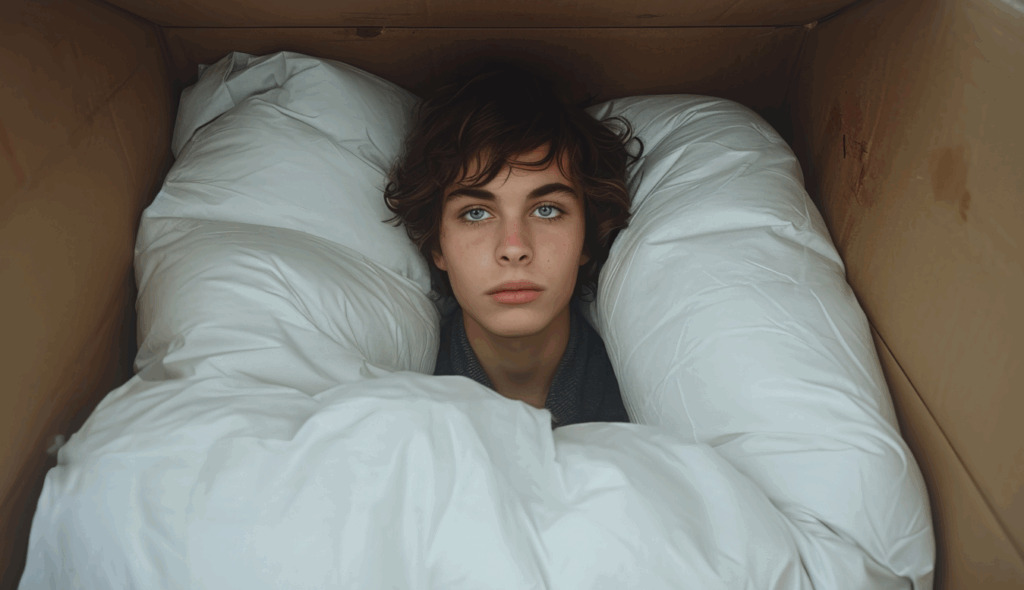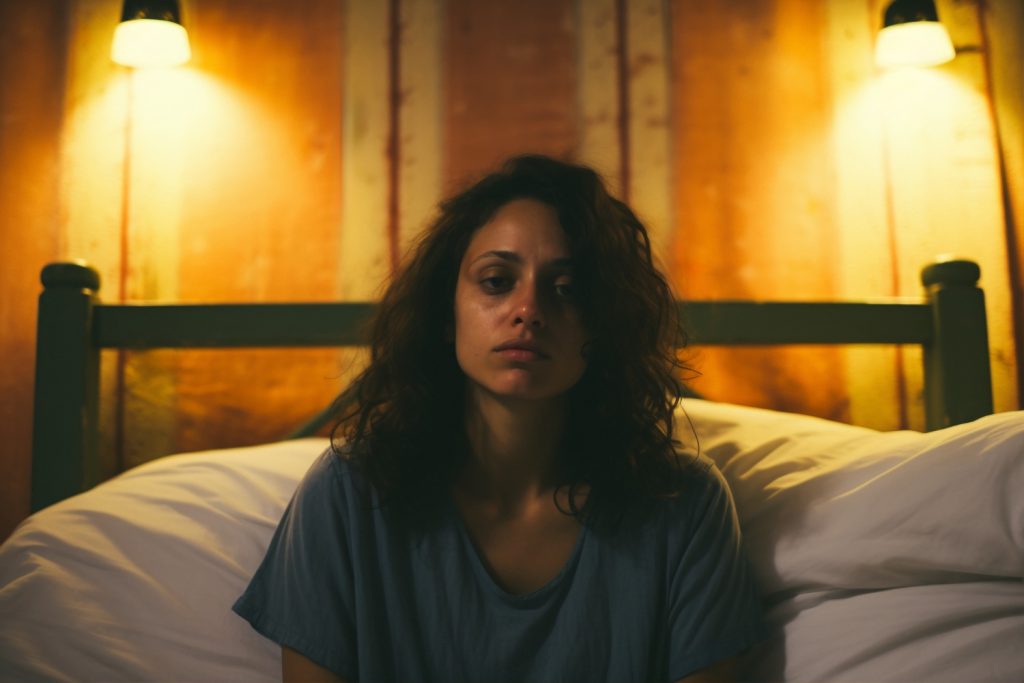We’ve all been there. You’re lying in bed, staring at the ceiling, watching the minutes tick by on your phone screen (which, spoiler alert, isn’t helping). Your mind is racing, your body feels restless, and you’re mentally calculating how many hours of sleep you’ll get if you fall asleep right now. Sound familiar?
If you find yourself regularly doing the midnight mattress mambo—you know, that frustrating dance of flipping from side to side—you’re definitely not alone. Millions of Americans struggle with falling asleep, and while there could be various reasons behind it, sometimes the culprit is hiding in plain sight: our daily habits.
Before you start Googling sleep disorders or considering a complete bedroom makeover, let’s take a closer look at some surprisingly common habits that might be keeping you up at night. You might be surprised to discover that the solution to better sleep could be simpler than you think.
The Late-Night Screen Time Spiral
Let’s start with the elephant in the room—or should I say, the glowing rectangle in your hand. We’re all guilty of it: scrolling through social media, watching “just one more” YouTube video, or checking emails right before bed. It seems harmless enough, right?
Here’s the thing: the blue light emitted by our phones, tablets, and TVs can mess with our body’s natural sleep-wake cycle. This light tricks our brain into thinking it’s still daytime, suppressing the production of melatonin—the hormone that helps us feel sleepy.
Think about it this way: for thousands of years, humans used the sun as their primary light source. When the sun went down, our bodies naturally started preparing for sleep. Now, we’re essentially carrying tiny suns in our pockets and staring at them right before we expect our brains to shut down for the night.
The “doom scrolling” phenomenon doesn’t help either. When we’re consuming negative news or getting worked up about something we saw online, our stress levels spike, making it even harder to wind down.
What you can try instead: Create a “digital sunset” in your home. Try putting devices away at least an hour before bedtime. If you absolutely must use a device, consider blue light filtering glasses or enable night mode on your screens.
Your Bedroom Has Become Your Everything Room
Remote work and smaller living spaces have turned many of our bedrooms into multi-purpose spaces. Your bed might serve as your office chair, dining table, TV viewing spot, and sleep sanctuary all rolled into one. While this might seem practical, it’s actually confusing your brain about what the bedroom is for.
Sleep experts often talk about something called “stimulus control”—basically, your brain creates associations with different environments. When your bedroom is used for work, eating, or entertainment, your brain doesn’t automatically switch into “sleep mode” when you lie down.
It’s like trying to meditate in Times Square. Technically possible, but your environment isn’t exactly setting you up for success.
What you can try instead: If possible, designate your bedroom (and especially your bed) for sleep and relaxation only. If you’re working from home in a small space, try to at least put work materials away and out of sight before bedtime.
The Caffeine Confusion
Most of us know that drinking a double espresso right before bed isn’t the smartest move, but caffeine’s effects can be trickier than you might think. Caffeine can stay in your system for 6-8 hours, which means that afternoon coffee at 3 PM could still be affecting you at 9 PM.
And it’s not just coffee. Caffeine lurks in tea, chocolate, some medications, and even decaf coffee (which isn’t completely caffeine-free). Some people are more sensitive to caffeine than others, and this sensitivity can increase with age.
Here’s where it gets interesting: you might not even feel “wired” or jittery, but the caffeine could still be interfering with your ability to fall into deep, restorative sleep.
What you can try instead: Pay attention to your personal caffeine cutoff time. For many people, avoiding caffeine after 2 PM works well, but you might need to experiment to find what works for you.
The Exercise Timing Trap
Exercise is fantastic for sleep quality—but timing matters more than you might think. Working out releases endorphins and raises your body temperature, both of which can be energizing rather than relaxing.
If you’re hitting the gym or going for a run close to bedtime, you might be inadvertently giving yourself a second wind right when you want to be winding down.
What you can try instead: Try to finish moderate to intense exercise at least 3-4 hours before bedtime. If evening is your only option for working out, consider gentler activities like yoga, stretching, or a leisurely walk.
The Temperature Tango
Your body temperature naturally drops as you prepare for sleep—it’s part of your circadian rhythm. When your bedroom is too warm, it can interfere with this natural cooling process.
Many people sleep in rooms that are warmer than ideal. The sweet spot for most people is somewhere between 60-67°F (15-19°C). It might feel chilly when you first get into bed, but your body heat will warm up the space under your covers.
On the flip side, some people crank up the AC so high that they’re actually too cold, which can also disrupt sleep.
What you can try instead: Experiment with your room temperature. You can also try cooling down your body before bed with a warm shower or bath—counterintuitively, this actually helps lower your core body temperature afterward.
The Irregular Schedule Shuffle
Our bodies love routine, especially when it comes to sleep. Going to bed at 10 PM on weeknights and 2 AM on weekends might seem like you’re making up for lost sleep, but it’s actually confusing your internal clock.
This is sometimes called “social jet lag”—you’re essentially giving yourself jet lag without leaving your time zone. Your body doesn’t know when it’s supposed to be awake or asleep.
What you can try instead: Try to keep your sleep and wake times consistent, even on weekends. If you need to catch up on sleep, consider going to bed slightly earlier rather than sleeping in much later.
The Stress and Worry Cycle
Sometimes the biggest sleep disruptor isn’t a habit at all—it’s our racing minds. When we lie down in the quiet darkness, suddenly all our worries, to-do lists, and random thoughts seem to get amplified.
The frustrating part is that worrying about not sleeping often makes it even harder to fall asleep. It becomes a vicious cycle: you can’t sleep, so you stress about not sleeping, which makes you more awake, which makes you more stressed.
What you can try instead: Keep a notepad by your bed to jot down worries or tasks for tomorrow—this can help get them out of your head. Some people find that listening to calming music, podcasts, or practicing relaxation techniques helps quiet their minds.
The Hidden Culprits
Sometimes the habits keeping us awake are so ingrained in our routines that we don’t even think of them as potential sleep disruptors:
Large meals close to bedtime: Your digestive system has to work overtime, which can interfere with sleep. That late-night pizza might be more problematic than you think.
Alcohol as a sleep aid: While alcohol might make you feel drowsy initially, it often leads to fragmented sleep and early morning wake-ups as your body processes it.
Inconsistent lighting: Bright overhead lights late in the evening can signal to your brain that it’s still daytime. Consider dimming lights in the evening and using lamps instead of overhead lighting.
The Sunday night phenomenon: Many people experience worse sleep on Sunday nights, often due to anxiety about the upcoming week or an irregular weekend sleep schedule.
Making Changes That Stick
Here’s the thing about changing habits: trying to overhaul everything at once usually backfires. Instead, consider picking one or two habits that resonate most with your situation and focus on those first.
Maybe you start with putting your phone in another room at night, or perhaps you experiment with your bedroom temperature. Small changes can often lead to surprisingly big improvements in sleep quality.
Remember, everyone’s sleep needs and sensitivities are different. What keeps your friend up all night might not affect you at all, and vice versa. The key is paying attention to your own patterns and being willing to experiment.
Your Sleep Environment Matters Too
While we’re talking about habits, it’s worth mentioning that your sleep environment plays a huge role too. Things like blackout curtains, a comfortable mattress, and managing noise levels can make a significant difference.
Sometimes we focus so much on what we’re doing wrong that we forget about optimizing what we’re doing right. Creating a bedroom environment that promotes sleep is just as important as avoiding habits that hinder it.
The Bottom Line
If you’re regularly tossing and turning, don’t assume you’re just “not a good sleeper.” More often than not, there are specific, changeable factors at play. The habits we’ve discussed are incredibly common, and recognizing them is the first step toward better sleep.
Good sleep isn’t a luxury—it’s essential for everything from your mood and energy levels to your ability to concentrate and make decisions. By identifying and gradually adjusting the habits that might be sabotaging your sleep, you’re investing in your overall quality of life.
Sweet dreams, and here’s to hoping your next night involves less ceiling-staring and more actual sleeping.

Disclaimer: Thanks for reading — from all of us at First News US. This article is for informational and educational purposes only and is not intended as medical advice. Sleep difficulties can sometimes indicate underlying health conditions that may require professional attention. If you continue to experience persistent sleep problems despite making lifestyle changes, consider consulting with a healthcare provider or sleep specialist. Individual experiences with sleep can vary significantly, and what works for one person may not work for another.
Sources and References:
- National Sleep Foundation guidelines on sleep hygiene
- American Academy of Sleep Medicine resources on circadian rhythms
- Harvard Health Publishing articles on sleep and lifestyle factors
- Centers for Disease Control and Prevention sleep health information



